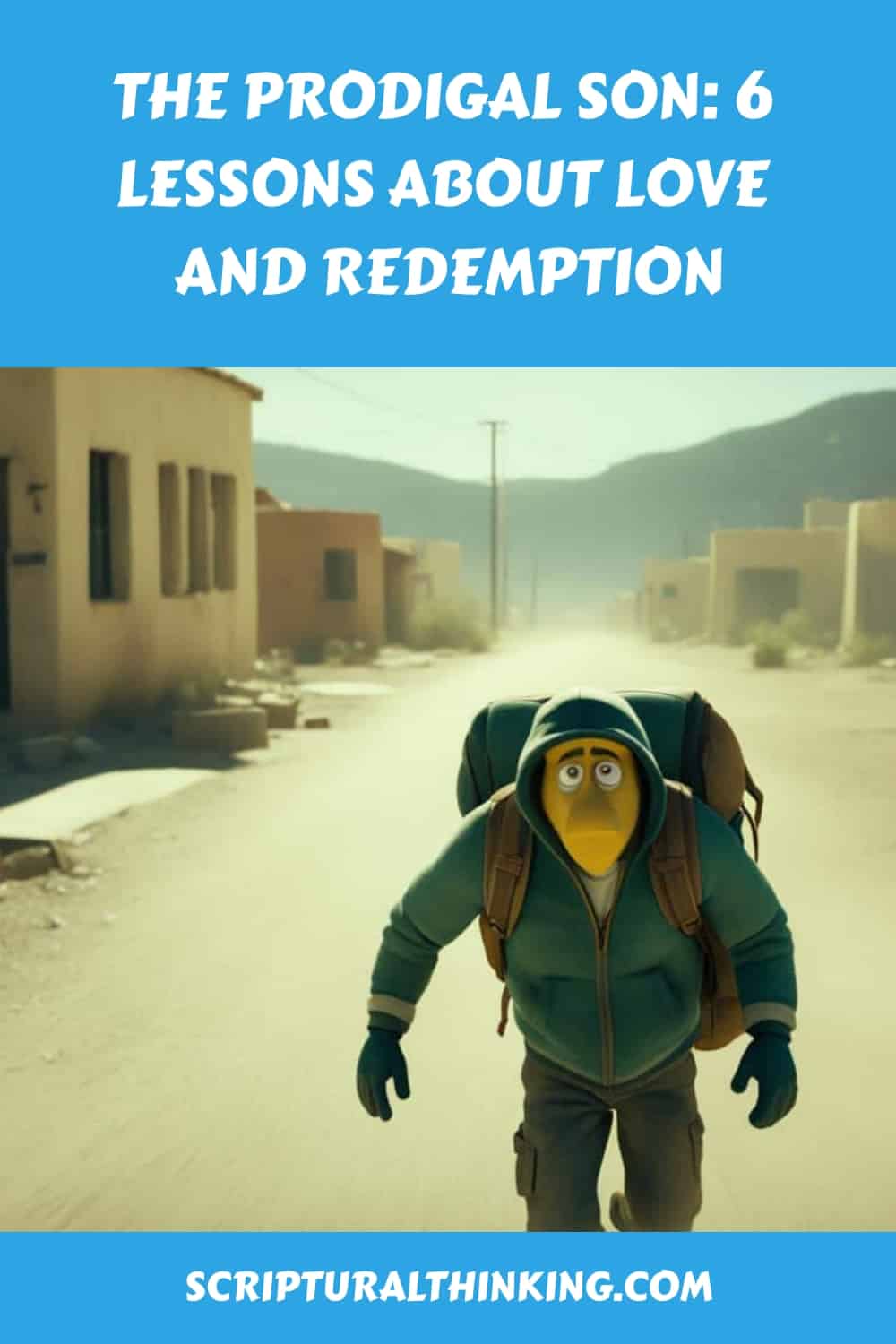Table of Contents
Have you ever wondered what it truly means to love unconditionally?
Is redemption possible for those who have made grave mistakes?
And how many second chances should one person be given?
These are the questions that the timeless parable of the Prodigal Son seeks to answer. In this article, we will delve into the profound lessons of forgiveness, love, and the power of second chances found within this captivating story.
Join us as we uncover the hidden gems of this ancient tale, shedding light on the transformative power of love, the healing potential of forgiveness, and the importance of embracing second chances.
Make Sure You Watch The Video: I would love for you to subscribe to my YouTube channel as well… Thanks in advance!!
Lesson 1: It’s Okay to Make Mistakes
The Prodigal Son teaches us that as humans, we are bound to make mistakes. We stumble, we falter, and we mess up. But the beauty lies in the realization that these missteps are an intrinsic part of our journey towards growth and self-discovery.
“Mistakes are the portals of discovery.” – James Joyce
When we make a mistake, it can be disheartening. However, the story of the Prodigal Son reminds us that it’s essential to acknowledge our oops moments, reflect on them, and take responsibility for our actions.
Realization is key. It’s during these moments of reflection that we grasp the valuable lessons hidden within our mistakes. They provide us with an opportunity to learn, adapt, and become better versions of ourselves.
Embracing Imperfection
Embracing our imperfections allows us to cultivate self-compassion and empathy towards others. It is through our mistakes that we gain a deeper understanding of the human experience and our shared vulnerabilities.
So, the next time you mess up, remember that it’s alright. Embrace the opportunity for growth and transformation that comes with making mistakes. Recognize your humanity, learn from the experience, and seize the chance for redemption and second chances.
In the words of Henry Ford, “The only real mistake is the one from which we learn nothing.” Let your mistakes be stepping stones towards a brighter future.
Stay tuned for the upcoming sections where we explore more profound lessons from the timeless parable of the Prodigal Son.
Lesson 2: Being Humble is Cool
The Prodigal Son’s journey teaches us the power of humility. It takes bravery to admit when we’re wrong and seek help when needed. By embracing humility, we open ourselves up to growth, learning, and deeper connections with others.
The Strength in Admitting Our Wrongs
Admitting our mistakes requires us to set aside our pride and ego. It takes humility to acknowledge when we’ve made a wrong decision or hurt others through our actions. By owning up to our wrongs, we take responsibility for our behavior and show respect for the feelings and perspectives of those affected. Admitting our wrongs is not a sign of weakness but rather a display of strength and maturity.
“To Err is human, to forgive divine.”
Admitting when we are wrong is an essential step in personal growth and building strong relationships. It shows that we value truth, openness, and integrity. It takes strength to admit to our shortcomings and work towards personal improvement.
The Strength to Ask for Help
Asking for help is not a sign of weakness. It’s a recognition of our limitations and a desire to improve. When we humble ourselves and seek the guidance and assistance of others, we open ourselves up to new perspectives and solutions. Whether it’s seeking advice from a mentor, collaboratively working as a team, or reaching out for support during challenging times, asking for help requires humility and demonstrates a willingness to learn and grow.
“It is not the strongest of the species that survives, nor the most intelligent that survives. It is the one that is most adaptable to change.”
Asking for help when needed allows us to tap into the expertise and experiences of others. It fosters collaboration, innovation, and personal development. Embracing humility and recognizing that we don’t have all the answers paves the way for collective growth and success.
The Power of Humility
Being humble enables us to connect with others on a deeper level. It cultivates empathy, understanding, and compassion. When we approach situations with humility, we are more open to different viewpoints and willing to learn from others. Humility allows us to recognize that we don’t have all the answers and encourages us to seek continuous improvement.
By embracing humility, we create an environment of trust and respect, where others feel comfortable sharing their perspectives and expertise. It fosters collaboration, creativity, and innovation.
“True humility is not thinking less of yourself; it is thinking of yourself less.” – C.S. Lewis
| Benefits of Humility | Impact |
|---|---|
| Improved Relationships | Builds trust, strengthens connections, and promotes cooperation |
| Growth Mindset | Fosters a willingness to learn, adapt, and embrace new experiences |
| Open-Mindedness | Encourages listening, empathy, and respect for diverse perspectives |
| Greater Self-Awareness | Facilitates personal growth, introspection, and the ability to recognize and address weaknesses |
| Positive Influence | Inspires others through humility, setting an example of grace, and encouraging collaboration |

By embracing humility, admitting our wrongs, and asking for help when needed, we enhance our personal growth, foster meaningful relationships, and create opportunities for collective success. Humility is not a sign of weakness, but a source of strength and resilience. It allows us to learn from our mistakes and become better versions of ourselves.
Lesson 3: Forgiveness is Powerful
The Prodigal Son’s father’s forgiving nature teaches us the immense power of forgiveness. It is a transformative act that can bring healing and create a space for love to flourish. When we choose to forgive, we let go of resentment and anger, allowing ourselves to move forward with a renewed sense of peace and freedom.
Forgiveness is not about condoning the wrongdoing or forgetting the pain. It is about releasing ourselves from the burden of holding onto grudges and finding the strength to let go. When we forgive others, we give ourselves the gift of emotional healing and open up the possibility for reconciliation and restoration of relationships.
“Forgiveness does not change the past, but it does enlarge the future.”
– Paul Boese
Forgiveness is not limited to forgiving others; it also involves forgiving ourselves. We all make mistakes and have regrets, but holding onto guilt and self-blame only hinders our personal growth and prevents us from embracing love fully. By forgiving ourselves, we allow for self-compassion, self-acceptance, and the opportunity to learn from our past actions.
Forgiveness is powerful because it breaks the cycle of pain and resentment, creating space for love and healing to thrive. It is a courageous act that requires vulnerability, empathy, and understanding. When we forgive, we grant ourselves and others the chance to start anew, to rebuild trust, and to cultivate deeper connections rooted in love and compassion.
The Transformative Effects of Forgiveness
The transformative effects of forgiveness extend beyond personal healing. Research has shown that forgiveness can lower stress levels, improve mental and physical well-being, and enhance relationship satisfaction. It promotes empathy, understanding, and a sense of interconnectedness.
When we forgive, we create a ripple effect of positivity and love. It allows us to break free from the chains of bitterness and resentment, fostering an environment of empathy, compassion, and understanding. Forgiveness paves the way for healthier relationships, stronger communities, and a more peaceful world.
Embracing Forgiveness in Your Life
Forgiveness is a journey, and it may not happen overnight. It requires intention, reflection, and a willingness to let go. Here are some practical steps to embrace forgiveness in your life:
- Acknowledge the pain: Recognize and validate the emotions associated with the hurt or wrongdoing.
- Choose forgiveness: Make a conscious decision to let go of resentment and seek healing.
- Practice self-compassion: Forgive yourself for past mistakes and embrace self-love.
- Communicate your forgiveness: If appropriate, express your forgiveness to the person who hurt you, allowing for reconciliation and growth.
- Seek support: If forgiveness feels challenging, consider seeking the guidance of a therapist or counselor.
Remember, forgiveness is a personal choice, and it may not always be easy. But by embracing forgiveness, you open yourself up to a world of healing, love, and transformation.
Lesson 4: Love is Unconditional
In the parable of the Prodigal Son, one of the most profound lessons is the portrayal of unconditional love by the father. Despite his son’s reckless behavior and poor choices, the father’s love remained unwavering and unconditional. This showcases the immense power and depth of love within a family.
Unconditional love goes beyond any conditions or expectations. It is a love that accepts someone exactly as they are, embracing their flaws and imperfections. It is a love that remains steadfast even in the face of disappointment or hurt. This type of love fosters an environment of acceptance and understanding, cultivating strong bonds within a family.
When love is unconditional, it creates a safe and supportive space for individuals to grow and thrive. It allows family members to be their authentic selves, knowing that they will be accepted and loved, no matter what. Unconditional love opens the door for genuine connection, empathy, and forgiveness.
“Love is patient, love is kind. It does not envy, it does not boast, it is not proud. It does not dishonor others, it is not self-seeking, it is not easily angered, it keeps no record of wrongs. Love does not delight in evil but rejoices with the truth. It always protects, always trusts, always hopes, always perseveres.” – 1 Corinthians 13:4-7
The Prodigal Son’s father exemplifies these qualities of unconditional love. His reaction to his son’s return is filled with compassion, joy, and open arms. He doesn’t hold grudges or dwell on past mistakes; instead, he embraces his son wholeheartedly, celebrating his return.

| Key Elements of Unconditional Love | Impact on Family Dynamics |
|---|---|
| Acceptance | Creates a sense of belonging and security within the family |
| Empathy | Fosters understanding and compassion for each other’s experiences |
| Forgiveness | Promotes healing and growth, allowing family members to move forward without resentment |
| Support | Provides a strong foundation for each family member to pursue their dreams and aspirations |
Unconditional love within a family paves the way for stronger relationships and harmonious interactions. It nurtures a sense of belonging, acceptance, and intimacy, allowing each family member to thrive emotionally, mentally, and spiritually.
By embracing the lesson of unconditional love from the Prodigal Son’s story, we can cultivate deep and meaningful connections with our loved ones, fostering an environment of acceptance and support that lasts a lifetime.
Lesson 5: Everyone Deserves a Second Chance
The parable of the Prodigal Son highlights the profound concept of second chances. It reminds us that no matter how far we may have strayed or the gravity of our past mistakes, we all deserve an opportunity for redemption and a chance to start anew.
Life is filled with twists and turns, and sometimes we make choices that lead us down a troubled path. But the beauty lies in the possibility of a clean slate, a chance to learn from our mistakes and grow into better versions of ourselves. Just as the Prodigal Son returned home seeking forgiveness, we too can embark on a journey of self-improvement and transformation.
Offering second chances is not only an act of kindness but also a testament to the power of compassion and understanding. By extending forgiveness and granting others the opportunity to make amends, we create an environment of empathy and personal growth. We become catalysts for positive change, fostering a sense of hope and redemption.
“No one is perfect. Everyone makes mistakes. But it’s how we respond to those mistakes that defines us.”
It’s important to acknowledge that nobody is immune to making mistakes. We all stumble, falter, and err along the way. Yet, it is through these experiences that we gain wisdom and develop resilience. By embracing our imperfections and recognizing that others are deserving of a second chance, we cultivate a culture of empathy and grace.
The Power of Redemption
Redemption holds the power to transform lives. It allows individuals to break free from the shackles of their past and embark on a journey of growth and self-discovery. When we extend a second chance to someone, we give them an opportunity to make things right, rebuild relationships, and find their true potential.
The Prodigal Son’s story serves as a timeless reminder that redemption is not only possible but essential for personal and collective healing. By embracing forgiveness and providing others with a clean slate, we contribute to the restoration of trust and the rejuvenation of hope.
No matter how dire the circumstances may seem, the message of the Prodigal Son resonates deeply within our hearts: Everyone deserves a second chance. Let us embrace this powerful lesson and foster a world where redemption and growth prevail.

What Lessons About Love and Redemption Can Be Learned from Moments of Love in the Face of Adversity?
In moments of love adversity, we learn the power of forgiveness and compassion. These experiences teach us that love can conquer all, and even in the face of hardship, there is room for redemption. It is through these challenging moments that we truly understand the depth of love and the capacity for healing.
Lesson 6: Celebration and Joy are Part of Healing
When the Prodigal Son returned home, his arrival was met with a grand celebration that showcased the healing power of celebration and joy. This teaches us an important lesson in embracing the transformative effects of celebration on our journey towards growth and healing.
Celebration is not merely an occasion for revelry; it is a crucial part of the healing process. It represents a collective acknowledgment and acceptance of someone’s return and their decision to change.
The joyous atmosphere created during celebrations fosters a supportive environment for growth and transformation. It reminds us that we are not alone in our struggles, and that our efforts to turn our lives around are met with love, acceptance, and encouragement.
In our own lives, celebration plays a vital role in healing. Whether it’s reaching a personal milestone, overcoming a difficult challenge, or making positive changes, it’s important to acknowledge and celebrate these moments.
When we celebrate our own journey, we reinforce our self-worth and give ourselves permission to experience joy in our accomplishments. This joy becomes a catalyst for further healing and personal growth.
Moreover, celebrating the growth and achievements of others fuels a sense of communal joy and connection. It unites us in our shared experiences and creates an atmosphere of support and encouragement.
By rejoicing in the healing and growth of others, we contribute to a positive and uplifting cycle that extends beyond individual celebrations.






